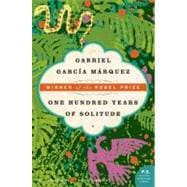About This Book
One Hundred Years of Solitude by Gabriel Garcia Marquez is a timeless masterpiece that has captivated readers for decades. This quintessential Latin American novel is a must-read for anyone interested in magical realism and the complexities of human experience.
Who Uses It?
Primarily, this book is used by students and educators in literature and cultural studies courses at the college and university levels. It's also a valuable resource for anyone interested in exploring the rich cultural heritage of Latin America, including professionals looking to deepen their understanding of literary works and their historical context.
History and Editions
First published in 1967, One Hundred Years of Solitude has been a cornerstone of 20th-century literature. The book tells the story of the Buendiá family and the rise and fall of the mythical town of Macondo, weaving together elements of fantasy, history, and reality. This novel remains a significant achievement in Garcia Marquez's Nobel Prize-winning career.
Author and Other Works
Gabriel Garcia Marquez is one of the most influential writers of the 20th century. Born in Colombia in 1927, he is known for his unique blend of magical realism and vivid storytelling. Some of his other notable works include Love in the Time of Cholera, Autumn of the Patriarch, and Chronicle of a Death Foretold. His writing often explores themes of love, family, history, and the human condition.
Key Features
- Magical Realism: The novel blends fantastical elements with realistic descriptions of life in Macondo, creating a unique narrative that is both enchanting and profound.
- Rich Cultural Heritage: The book offers a deep dive into Latin American culture and history, making it an essential read for anyone interested in the region's literary traditions.
- Timeless Themes: The novel explores universal themes such as love, family, solitude, and the cyclical nature of time, making it a timeless classic.
Detailed Information
ISBNs and Formats
Hardcover: ISBN-13: 9780060883287
eTextbook: ISBN-13: 9780060883294 (The ebook for "One Hundred Years of Solitude" is available right here on eCampus.com!)
eTextbook: ISBN-13: 9780060883300 (The ebook for "One Hundred Years of Solitude" is available right here on eCampus.com!)
Loose-leaf: ISBN-13: 9780060883317
Rental Options: Available through eCampus.com with various rental durations
Publication Details
Publisher: Harper Perennial
Publication Date: 2003
Number of Pages: 416
Language: English
Other Editions and Formats
- Paperback: Available through various retailers.
- Downloadable PDF File: Available for purchase.
Related ISBNs:
9780060883294
9780060883300
9780060883317
Rental options are available through eCampus.com.









